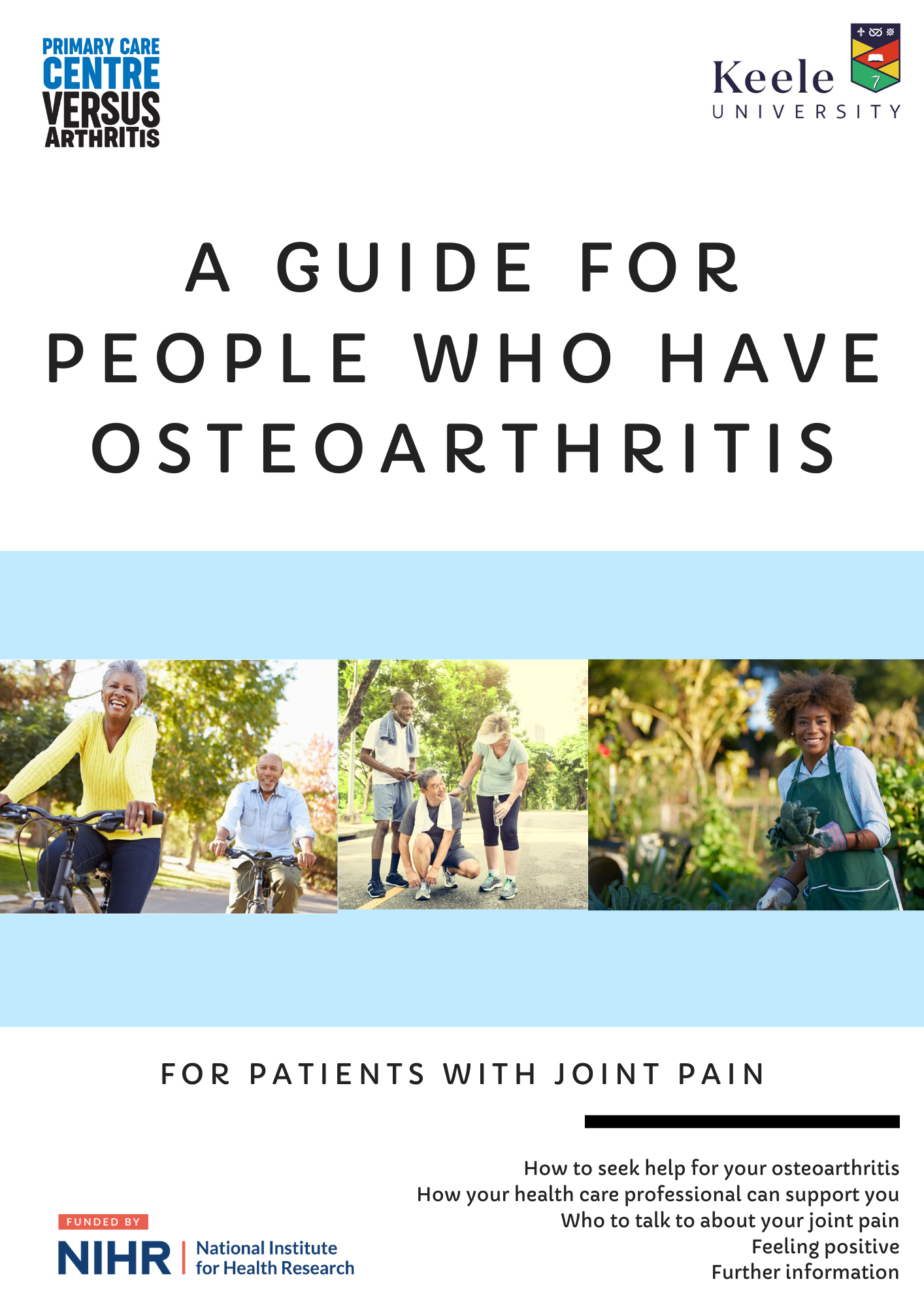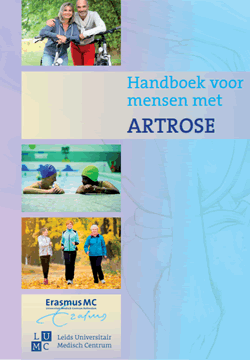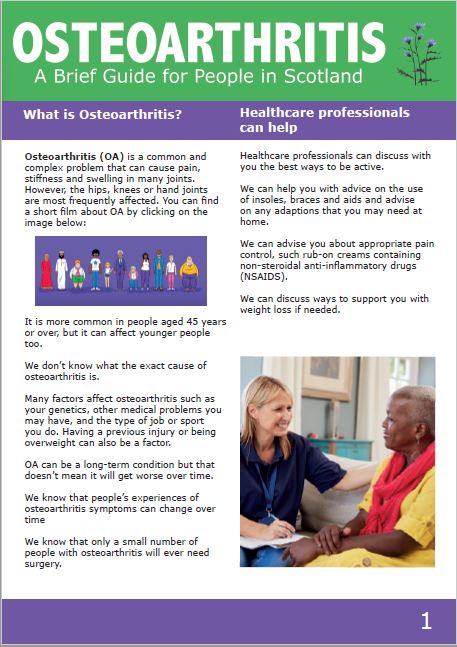Patient information (Osteoarthritis Guidebook)
The full pages of the guidebook can be found here: https://www.jigsaw-e.com/patient-focus/guidebook/
England

Background:
Within MOSAICS, the Keele University Osteoarthritis Guidebook was developed by patients for patients. This was updated in 2014, in line with the NICE guideline update. Within the trial, positive patient and professional feedback about the guidebook was obtained.
Supporting evidence
Paper detailing the development of the Osteoarthritis Guidebook: Grime J, Dudley B. Developing written information on osteoarthritis for patients: facilitating user involvement by exposure to qualitative research. Health Expectations. 2011;17(2).
Paper detailing the acceptability of the Osteoarthritis Guidebook: Morden A, Jinks C, Ong BN, Porcheret M, Dziedzic KS. Acceptability of a ‘guidebook’ for the management of Osteoarthritis: a qualitative study of patient and clinician’s perspectives.
Use in JIGSAW-E
In the UK, the Keele University Osteoarthritis Guidebook has been implemented without further alteration from the 2014 update. This guidebook has been culturally adapted in full for use in the Netherlands. Sections of the handbook have been culturally adapted for use in Denmark. This handbook does not contain exercise information, within the UK, patients are signposted to, or provided with hard copies of, the Arthritis Research UK Keep Moving leaflet and/or joint-specific exercise leaflets.
A partnership in implementation: Adapting the osteoarthritis guidebook across European cultures: with patients, for patients
The osteoarthritis guidebook was co-developed with UK patients during the MOSAICS study, and has been successfully translated and culturally adapted to local context by a panel of 17 Patient Champions across the five different countries. In the UK to date, 1173 copies of the guidebook have been given to osteoarthritis patients. One of the aims of JIGSAW-E is to disseminate the resource across Europe and adapt it as appropriate.
The patient panel is a key part of the Community of Practice. Members all have some experience of osteoarthritis. It is connected and supported by the project’s international Knowledge Broker and PPIE leads.
The cultural and linguistic adaptation of this guidebook for use by patients in each of the countries emerged as a priority project from the Community of Practice launch event. Whilst clinicians and academics on the project concentrated on the first three innovations, patients had a very strong steer on the fourth one and were instrumental in deciding early on how and in what format patient facing information would be used in their country.
Working with a PPIE lead in each country, Patient Champions adopted a process appropriate to their specific context.
Netherlands
The Netherlands was the first country to launch JIGSAW-E outside of the UK, at the start of 2017.
The process of adapting the guidebook started early on, with a core group of three Patient Champions. The team also linked with two national patient organisations to enable wider consultation.
Patient Champions reviewed the translation of the osteoarthritis Guidebook and advised on improving the accuracy of the translation and the lay language.
The team then culturally adapted the guidebook to ensure the content, images and layout were appropriate for a Dutch population. 295 guidebooks have so far been distributed to patients and feedback has been positive. The Dutch team are in the process of evaluating the Dutch version of the guidebook with a group of 12 stakeholders and patients.
It is available in pdf form on two websites, including the home page of a national Dutch charity – https://www.poly-artrose.nl/.

Norway
Norway launched their version of the project after the Netherlands, in March 2017.
The two Patient Champions there felt that they already had existing good quality patient information in the form of the ActiveA book. They therefore decided to translate and adapt Chapter 6 of the UK guidebook entitled ‘Feeling positive,’ saying that they would prefer a shorter version supporting emotional wellbeing and ActiveA to be used together.
The team are currently discussing with ActiveA whether they can publish the translated chapter on the ActiveA website.
Denmark
Denmark launched soon after Norway, in April 2017. The team there established a ‘Patient Club’ which included four Patient Champions.
The Patient Club felt that the UK guidebook was very comprehensive and although useful for some people, they wanted to create a shorter, more eye catching flyer, to accommodate the different learning styles of patients.
They therefore decided on the most relevant and important information from the guidebook and created an easy to read four-page summarised leaflet. It was suggested that patients are more likely to pick up a flyer to take home and read, perhaps referring to the longer OA guidebook if they need more information.
Five patients were selected from a larger group of 15 to translate and culturally adapt the guidebook. Language translation is now complete.
The team want to make the OA guidebook available to 30,000 GLA:D patients
Portugal
Portugal officially launched the project in Summer 2017 but an initial meeting was held in April 2017, which brought together health care practitioners, patients, rheumatologists, psychologists, exercise specialists, nutritionists and alternative medicine practitioners to discuss the project. Since then the team have held a further successful event to disseminate the idea, with 300 patients.
The team have met with the local branch of the National Patients Association and are in the middle of the cultural adaptation of the guidebook which has now been translated in full with support from the Patient Champions.
The eventual aim is to publish the guidebook within the local healthcare system.
Scotland
The guidebook was culturally adapted for Scottish patients and the public and is now being shared widely across the Lothian area. Patients preferred a shorter version, and so this four page leaflet was created.
You can download the guidebook here: Scottish Osteoarthritis brief guide 2020

Lessons learned
- Involving patient champions in the adaptation of patient information keeps it culturally relevant, useful to patients and helps to create impact
- Developing, encouraging and sustaining communication and relationships between Community of Practice members across all partner countries is vital for effective and meaningful patient involvement.
- There is a need to ensure Patient Champions are made aware at the beginning of the project of what will be expected of them – for example time commitments
- Engaging with established national patient charities can be an effective way to consult a wider population of patients and networks
- Patient Champions offer a unique insight to both research and implementation projects. The expertise by experience that patients have brought to JIGSAW-E has kept the patient at the heart of the project, encouraged a different way of thinking, sparked creativity and maintained momentum.